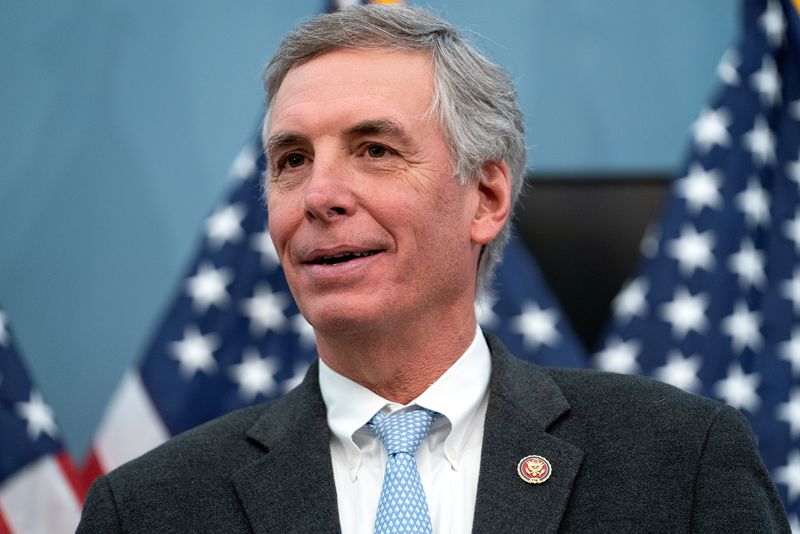By Eric Beech and Jason Lange
WASHINGTON (Reuters) -Republican U.S. Representative Tom Rice, who voted to impeach Donald Trump after the Jan. 6 U.S. Capitol riot, lost his re-election bid in South Carolina on Tuesday, while a second Republican incumbent targeted by the former president prevailed.
Trump-backed candidate Russell Fry handily defeated Rice, a five-term incumbent who became a prime target in Trump's midterm revenge campaign against perceived political enemies.
Rice was one of 10 congressional Republicans to vote for Trump's impeachment and now is the first of that group to lose re-election. Some others opted not to run.
"The voters have spoken and Tom Rice is coming home," Fry, a state legislator, told supporters in the strongly Republican district he is expected to win in the November general election. "Today, Donald Trump won."
Jim Marchant, who falsely claims the 2020 election was stolen from Trump, won the Republican primary election for Nevada secretary of state, Edison Research projected.
Among 2020 election deniers running for elections posts across the country, Marchant, a former state legislator, distinguished himself by claiming that elections have been rigged for decades and by arguing that electronic voting machines should be replaced by paper ballots. He had also blamed his own 2020 U.S. House loss to Democratic Representative Steven Horsford on election fraud.
In another South Carolina district, freshman U.S. Representative Nancy Mace fended off a challenge from Trump-endorsed opponent Katie Arrington, Edison Research said.
Rice and Mace each ran afoul of Trump after his supporters attacked the U.S. Capitol on Jan. 6, 2021, while Congress worked to certify the 2020 presidential election. The riot is now the subject of a bipartisan congressional investigation that focused this week on Trump's false claims of a stolen 2020 election.
Mace drew Trump's ire by refusing to back Republican efforts to challenge the 2020 presidential election results.
The results on Tuesday will be seen as a measure of Trump's continued influence over the Republican Party as he hints at another run for the White House in 2024. His endorsees so far have had mixed success in battleground states including Ohio, Pennsylvania, Georgia and North Carolina.
Voters also cast ballots on Tuesday in Nevada, Maine and North Dakota to choose party nominees to compete in the November general elections for the U.S. Senate and House of Representatives.
With Democratic President Joe Biden slumping in the polls and soaring inflation souring voters' moods, Republicans are expected to win control of the House of Representatives and possibly the Senate. That would bring Biden's legislative agenda to a halt and give Republicans the power to launch investigations that could be politically damaging.
A Reuters/Ipsos opinion poll completed on Tuesday showed Biden's public approval rating at 39%, in its third straight weekly decline, approaching the lowest level of his presidency. Fifty-six percent of Americans disapprove of Biden's job performance.
REPUBLICAN FLIPS HOUSE SEAT
Republicans got a boost in South Texas, where party candidate Mayra Flores defeated Democrat Dan Sanchez in a special election to capture the seat vacated by former Democratic Representative Filemon Vela in March, according to Edison Research.
Flores will fill the vacancy for the remainder of Vela’s term, which expires in early January. Although the victory raises Republican hopes of flipping more Democratic seats in November, the district’s boundaries have been redrawn for the fall vote to make it more favorable to Democrats.
In Nevada, Trump-endorsed Adam Laxalt, a former state attorney general, won the Republican primary for a crucial U.S. Senate race, defeating a crowded field of contenders, according to Edison Research.
In November, he will run against Senator Catherine Cortez Masto, considered one of the most vulnerable Democrats in the 2022 midterm campaign.
Marchant will face a Democrat in the Nov. 8 general election for a post that oversees elections in Nevada. Trump did not endorse a candidate in the Republican primary. However, Marchant received endorsements from high-profile conservatives, including former Trump White House Chief of Staff Mark Meadows and pro-Trump businessman Mike Lindell.
Marchant beat six other Republican candidates in the secretary of state contest and had a lead of 16.7% against the candidate closest to him at the time he was projected the winner by Edison Research.
Republicans also were selecting nominees to run against three vulnerable House Democrats from Nevada - Horsford, Dina Titus and Susie Lee.
Titus defeated a challenge from progressive Democrat Amy Vilela, according to Edison Research.

In Maine, Paul LePage, whose turbulent eight years as the state's governor foreshadowed Trump's rise, ran unopposed for the Republican nomination to challenge Democratic Governor Janet Mills in November.
LePage, who once described himself as "Donald Trump before Donald Trump became popular," was widely criticized as governor for his inflammatory remarks on a host of topics from immigration, the environment and LGBTQ issues to abortion and voting rights. He left office with an approval rating below 40%.
